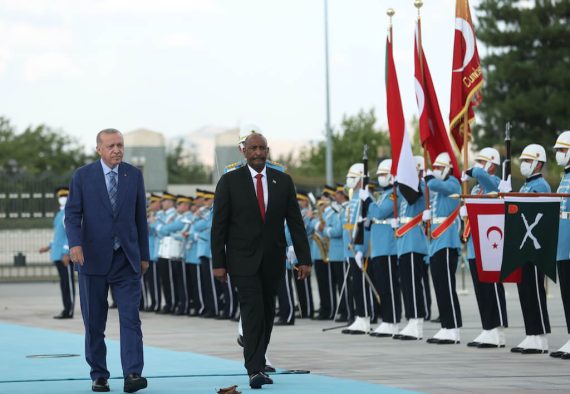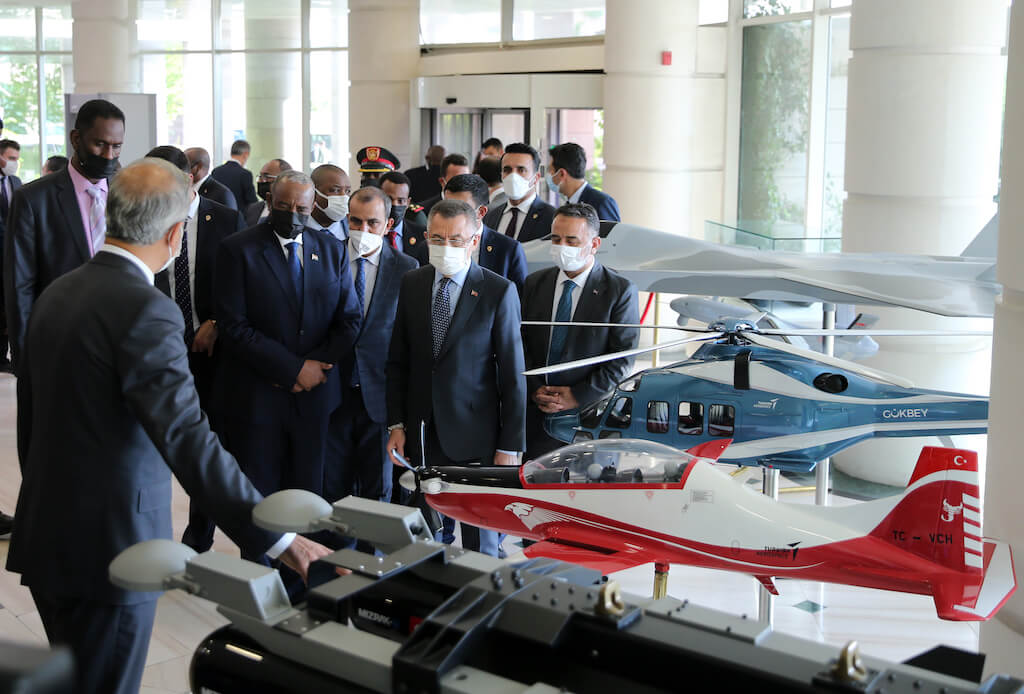The year 2021 is seeing regional repositioning of power, competition, and strategic alignment. A series of normalization moves have taken place between Saudi Arabia and Iran, Egypt and Turkey, Saudi Arabia and Qatar, Turkey and the UAE, and Turkey and Sudan, which would have been impossible a few months back. Since 2011, whoever is in the White House has been focusing more on U.S. primacy than the concerns of Washington’s traditional allies. This U.S. policy has directly affected the Middle East and Africa.
Sudan, which has been affected by these transformations since 2019, is not an exception. Even though Sudan suffers from economic challenges, primary among which is inflation, the administration in Khartoum is decisive in diversifying foreign policy alternatives and intensifying cooperation with regional actors. In this manner, the chairman of Sudan’s Sovereign Council Abdel Fattah al-Burhan visited Turkey on August 12-13 to expand the cooperation between the two countries. Official Sudanese statements show that Khartoum is eager to cooperate with Ankara. It is the first-ever visit of Sudan to Turkey at the head of the state level since the country witnessed popular protests against the ousted president Omar al-Bashir in 2019.
Gradual Coherence
Turkey-Sudan relations had reached advanced stages during the term of ousted president Omar al-Bashir. However, after the dismissal of al-Bashir, there was a decline in this relationship, especially politically. What is more, Ankara-Khartoum relations were adversely affected by developments in Sudan. As for regional issues, the two countries had adopted opposite approaches. For example, whereas Turkey supported the Government of National Accord (GNA) in Libya, mercenaries from Sudan fought for Khalifa Haftar. Later, a gradual coherence was observed between the two parties.
Turkish President Erdoğan paid three visits to Sudan in 2006 and 2017. Whether during his prime ministership or presidency, Sudan remained in Erdoğan’s geopolitical vision of Africa. During these visits, the bilateral relations were strengthened by the signing of several agreements. In 2020, Mohamed Hamdan Dagalo, the vice president of Sudan’s Transition Council, visited Turkey. In April 2021, Vice President of Turkey Fuat Oktay visited Niger where he met with Dagalo.
The photos of the meeting indicate that the Oktay-Dagalo meeting took place in a very warm atmosphere. In his statement, Vice President Oktay reiterated that Turkey wishes to deepen and broaden the two countries’ bilateral relations. Moreover, Turkey’s President Erdoğan talked over the phone with Burhan many times to discuss potential cooperation, and successive visits followed.
Possible Cooperation Areas
During the latest visit of Sudanese officials to Turkey, six memoranda of understanding and agreements from energy to media were signed. As a result, we can expect intense bilateral cooperation between the two countries in the near future. During my field research in Khartoum from March to June of this year, I encountered many Sudanese who are closely following Turkish foreign policy vis-à-vis Africa. Turkey has embraced almost every African country even though there is a strong anti-Turkey propaganda in the Middle East.

VIDEO: Political Blocks in the Middle East
Turkey’s Africa policy is shaped by an approach that aims to develop mutual benefits. Instead of exploitation, Turkey has rented a large agricultural land in Sudan for 49 years. The Sudanese are very eager to see Turkey’s investment in their country. Many Africans believe that Erdoğan is the architect of democratization in some African countries. In an op-ed, Justice Minister of Somalia Abdulkadir Mohammad Nur stated that Turkey is the hope for African countries to stabilize their democratic political structures.
Turkish aid organizations like TIKA and Kızılay have extended their helping hand to the people of Sudan especially during natural calamities.
Turkish aid organizations like TIKA and Kızılay have extended their helping hand to the people of Sudan especially during natural calamities. Turkey provides medical supplies to support Sudan’s fight against COVID-19. East of Khartoum, Kızılay has renovated a medical center where children with Down syndrome are educated while TIKA has been involved in constructing Nyala Hospital since 2014. Turkey has been also providing around 700 scholarships to Sudanese students since 1992 under the umbrella of the Türkiye Scholarship Program. These indicators are representative of Turkey’s sizable financial assistance to the people of Sudan.
Moreover, there is a bilateral trade volume between Turkey and Sudan. According to Turkish Statistical Institute, Turkey’s exports to Sudan increased by 22.25% in 2020 compared to 2019, and Sudan became the sixth largest export partner in Africa worth over $300 million. The Sudanese minister of energy and oil announced that they have agreed with Turkey to increase electricity production by 67% by using Turkish floating ships. Revealing the will of both sides to boost trade, the two countries promised to increase their bilateral trade volume to $2 billion.
Strategic Calculations
The deepening of bilateral ties will provide several strategic benefits to both Turkey and Sudan. Right now, Turkey has been standing by the Sudanese transition government. Turkey refrains from addressing sensitive topics with Sudan like the overthrowing of Omar al-Bashir by non-democratic means. This policy paves the way for Sudan to reach out and reapproach Turkey. The recent visit by al-Burhan, the highest-ranking Sudanese official, to Turkey where he met with President Erdoğan shows that the Sudanese transitional government, which distanced itself from Turkey for a long time after the coup, has realized that it must diversify its foreign policy.
The visit of Sudanese officials to Turkey is linked to the recent Ethiopian official visit to Turkey. There is strategic strangulation in the Egypt-Ethiopia-Sudan triangle. Serhat Orakçı, an analyst of African politics, told Politics Today that there are three reasons for the increasing tensions between Egypt and Sudan on the one hand, and Ethiopia on the other hand. These are border disputes, the unsettled issue of water resources, and Ethiopia’s Tigray crisis.
None of the efforts by international or regional organizations to reconcile the parties of the conflicts and resolve these issues could lead towards a lasting peace and settlement. Therefore, each party is trying to maximize its material and diplomatic cooperation with relevant regional actors. With this view, Sudan views having good relations with Turkey as part of reinforcing its strategic capabilities.
It is well known that during Omar al-Bashir’s rule, Turkey-Sudan relations were strong. With the new government in Khartoum, though, bilateral relations suffered a setback. Now, it appears that Sudan is more interested in cooperation with Turkey. The latest visit by Sudanese officials to Turkey is an important indicator of this interest. It is most likely the heavy diplomatic efforts made by Ethiopia to approach Turkey might be behind Sudan’s increasing interest in Ankara.
Sudan Needs Turkey’s Support
The recent months have shown that Ethiopia, which is under pressure from the West, is eager to upgrade its bilateral relations with Turkey from an ordinary level to a strategic one. By deepening its ties with Turkey in terms of military cooperation, Ethiopia wants to strengthen its military power. Sudan hasn’t remained silent either. This atmosphere has forced Sudan to move closer towards Turkey. When we compare Sudan’s will to reach out to Turkey, it is Sudan that is more interested in increasing its bilateral cooperation. Sudan could also ask Ankara to play a mediator role in the deadlock between conflicting parties.
The political trajectory of Sudan shows that it wants to escape from the hold of the UAE. The UAE has been trying to build a new regional order in which there is no room for any democratic transition unless the political elite in the region obeys Abu Dhabi. Therefore, by upgrading its relations with Turkey, Sudan wants to balance its relationship with the UAE and Egypt without abandoning them. This policy could be described as a hedging game: Sudan is hedging itself against the UAE and Egypt by getting closer to Turkey. Therefore, Sudan wants to become more independent and exit its isolation by approaching Turkey. The recent visit by Sudanese officials to Turkey can be seen as a clear message from policymakers in Khartoum indicating Sudan’s will to maneuver its foreign policy.
Recommended
Sudan wants to build an allyship relationship with Turkey. Since 2016, Turkey has conducted several successful military operations in Syria and Iraq. Ankara has contributed to changing the balance of power in the Middle East. The American political scientist Francis Fukuyama argued that Turkey’s drones are a game-changer and are transforming unconventional warfare into more complex ideas in the world. Sudan looks up to Turkey’s highly successful military industry. Furthermore, Turkey is not just powerful militarily, but also in terms of its democratic legacy and institutions. Therefore, if Sudan’s new political elites decide to transform the country, Turkey is the best example to look up to.
The latest visit of Sudanese officials to Ankara will leave a positive impact on bilateral relations, which could be upgraded to strategic cooperation. It seems that Sudan wants to turn a new page in its relations with Turkey; however, Turkey-Sudan relations should not be expected to reach the strength of the relations during the Omar al-Bashir era in a short time as a significant role will be played by actors, such as the UAE, who are uncomfortable with this rapprochement. Nevertheless, such a development can create a win-win situation for both countries. In the meantime, Ankara’s doors are always open for strengthening bilateral relations with Sudan.






